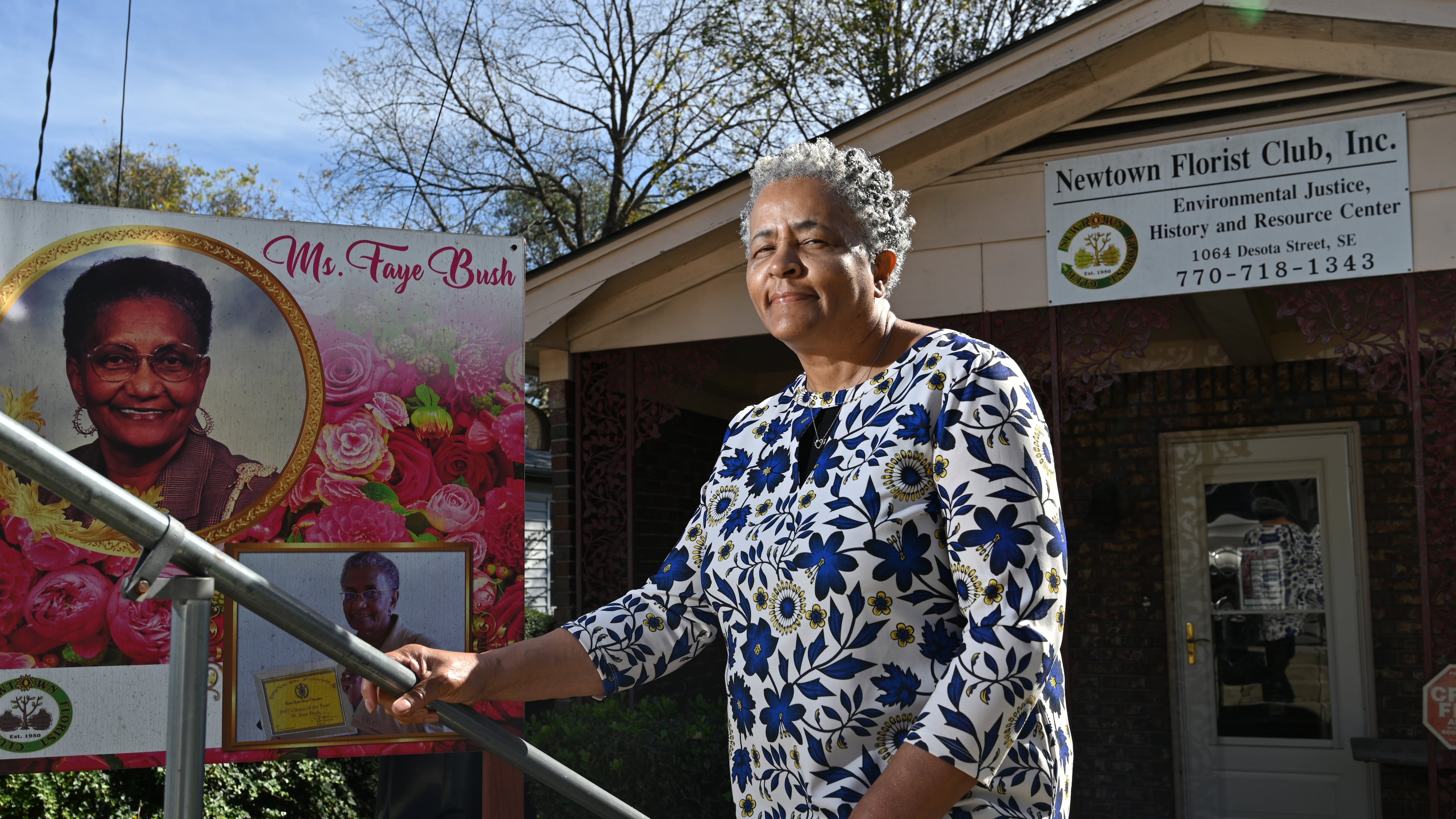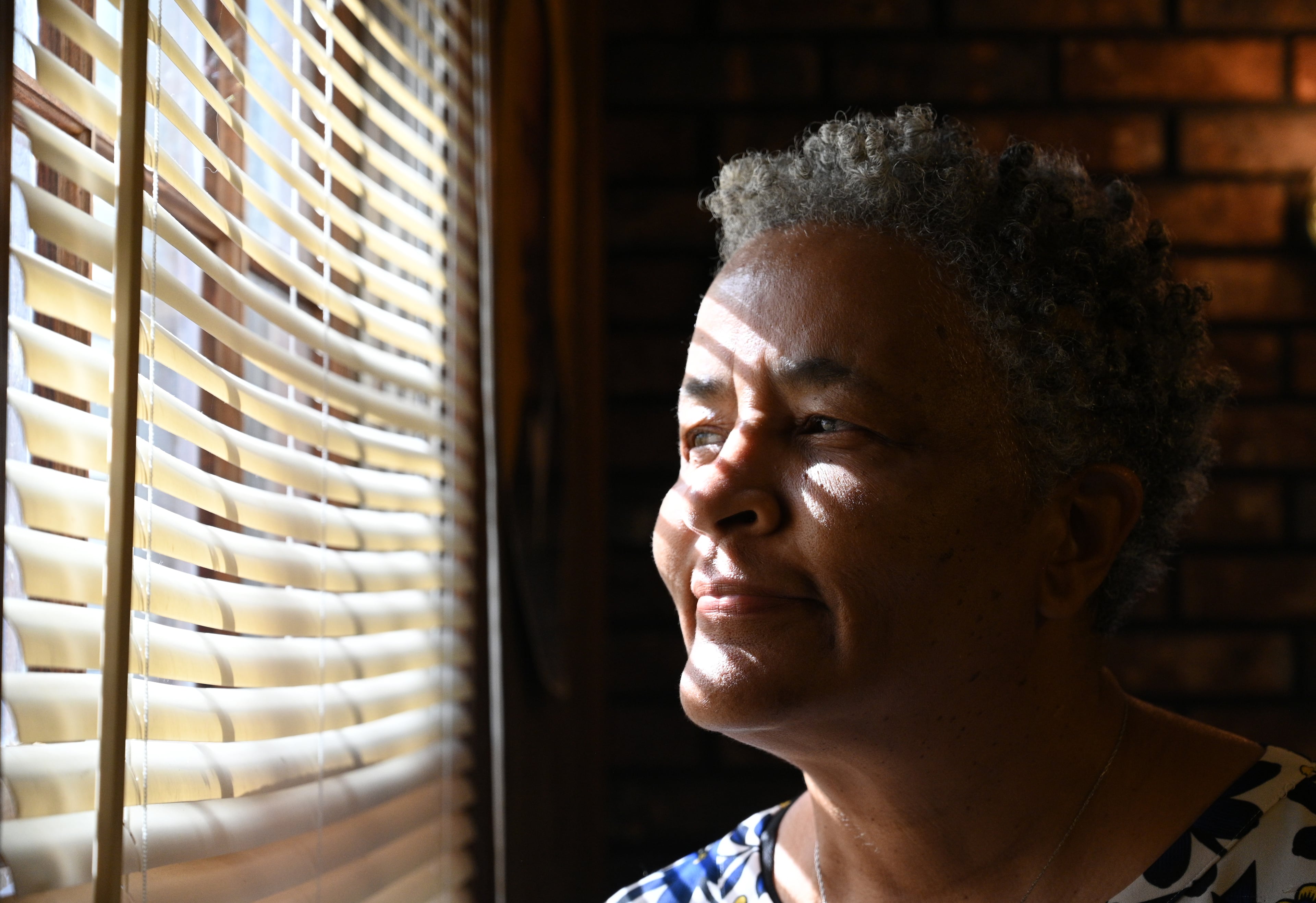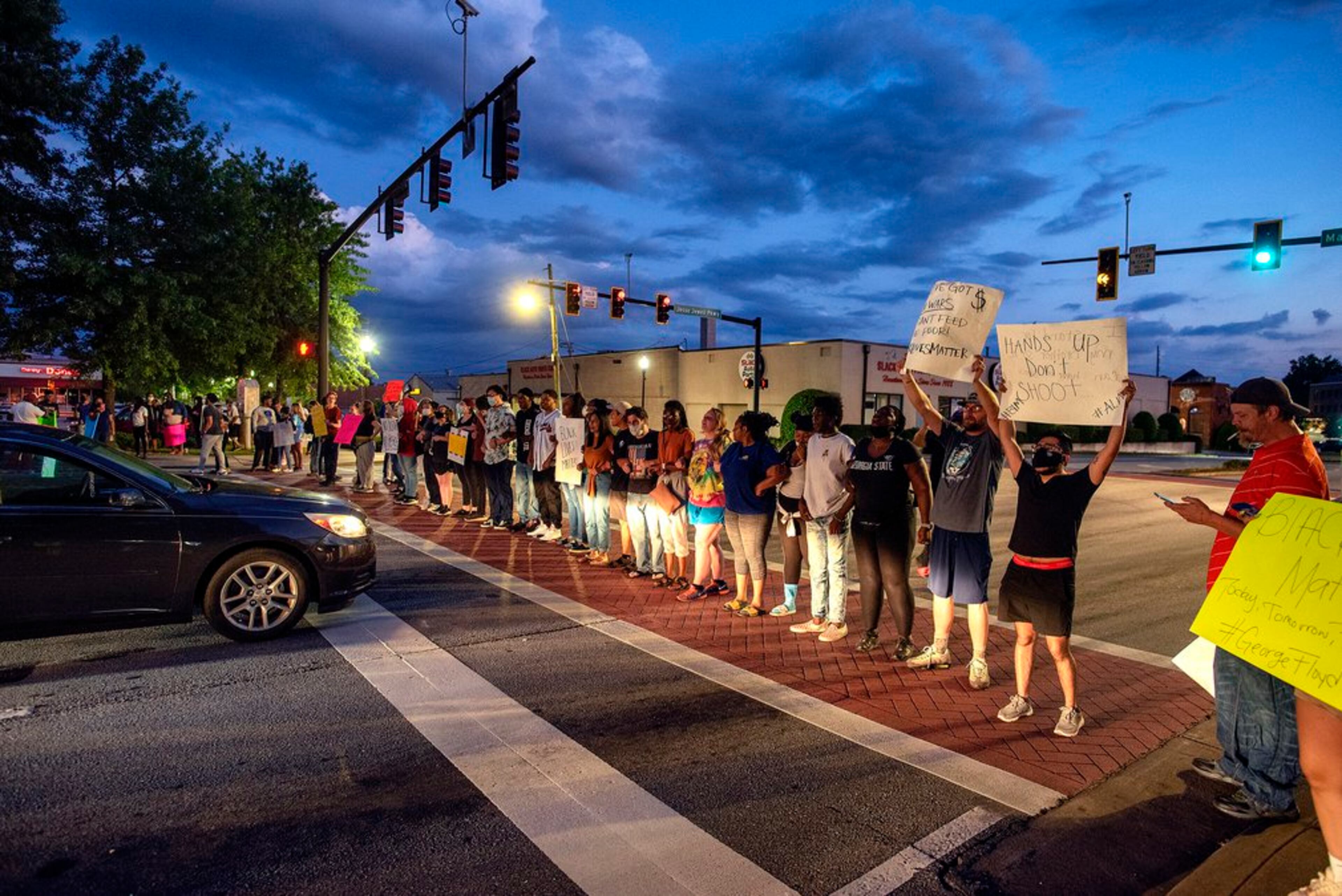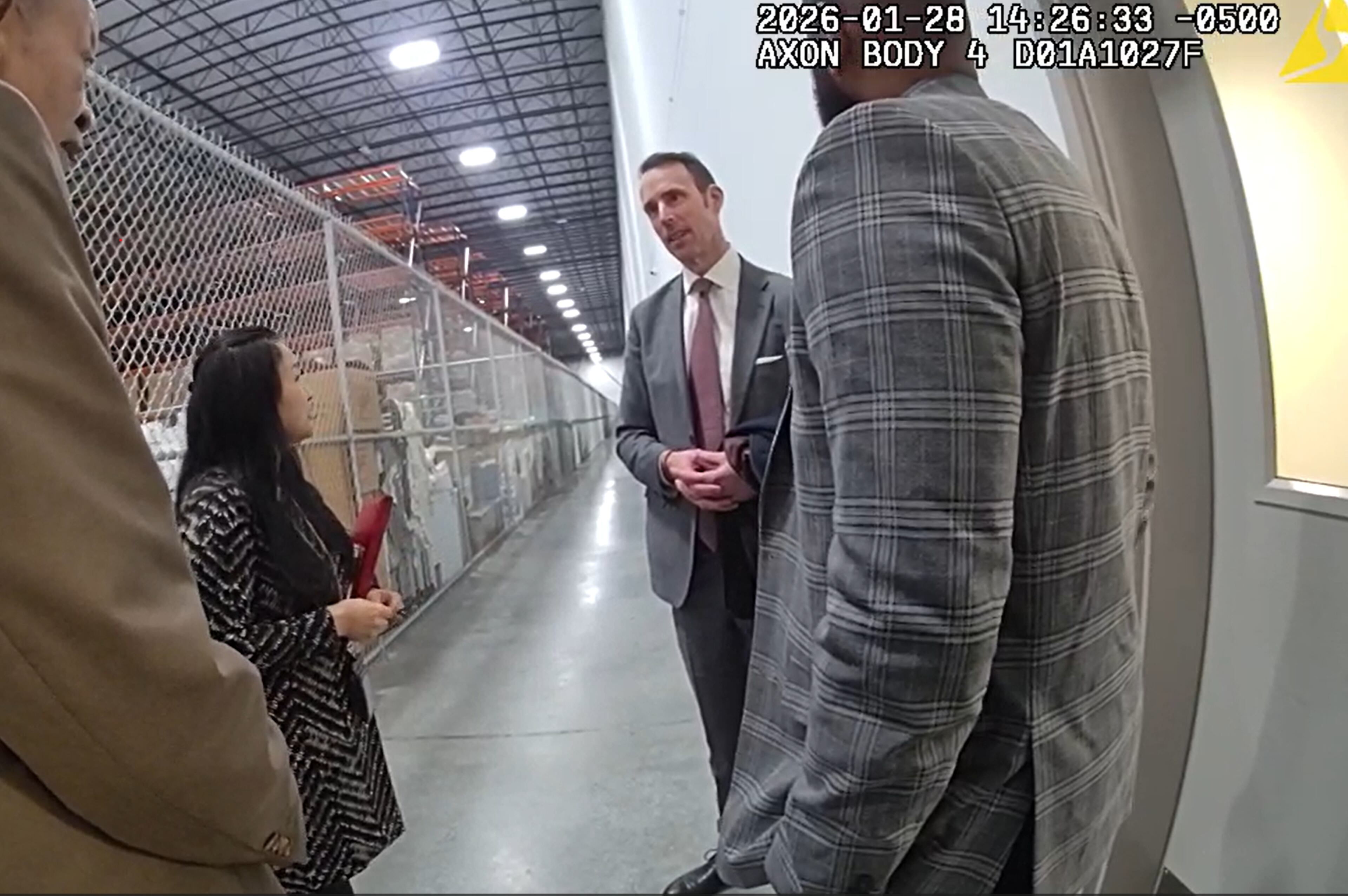Teaching others to ‘push past hate’ in Georgia

Some of the young men, bristling with anger, were stockpiling bricks and other projectiles to hurl through storefronts.
It was the wake of George Floyd’s murder in 2020, and downtown Gainesville seemed ready to explode.
Into this combustible scene waded the Rev. Rose Johnson with a megaphone, calling for a prayer for Floyd and his family.
The crowd quieted. Then she said something that sent forth a ripple of consternation. She called for a prayer for Derek Chauvin and the other officers involved in that very public killing, and their family members.
Johnson speaks in a gentle contralto honed in the pulpit, no less powerful for being measured. People normally feel compelled to do what she says. Her gambit worked. The protest stayed peaceful, and law enforcement breathed a sigh of relief.
“If we’re really going to walk the walk of peacemaking, that walk has to take into account everybody, and I mean everybody, and their families, everyone who is affected, the whole circle that is impacted,” Johnson says, reflecting on that moment. “You don’t leave out people, even people you don’t agree with. Especially the people you don’t agree with. You meet people where they are and go from there.”

‘A good place to grow up’
For decades now, Johnson, 69, has been the moral conscience of Hall County, a darling of both the left and right in divisive times.
Part of the first class to integrate Gainesville High School in 1969 (“That was a tumultuous time,” she says), she studied political science at Atlanta Junior College, then X-ray technology. She worked in the medical field for 13 years before earning scholarships to attend the College of Charleston, where she majored in theological studies, and then the Candler School of Theology at Emory University. She now serves as pastor at St. Paul A.M.E. in Sandersville, a tiny “prayerful” church that was about to close its doors until she came along.
With the late Rev. Terrance Mackey, whom she divorced before his death, she had two daughters who gave her six grandchildren.
Born in Gainesville, the county seat located near the foothills of Appalachia, she moved to the Newtown community when she was 12. The middle child between two brothers, Johnson was brought up by a single mother who worked at a nearby poultry plant.
Gainesville has a population of about 42,000; Blacks comprise less than 17% of its residents. It has never garnered much attention in the civil rights movement, but it has witnessed heroism in the struggle, starting with the Newtown Florist Club.
The homespun group organized in 1950 as a sort of benevolent society that provided flowers and other comforts to grieving families in Newtown, a community of 75 houses on the south side of town. Johnson attended her first meeting at age 12 and was swept up by its generous spirit and the strong women who led it.
“They were so powerfully dynamic, inspirational, courageous and liberating — I became hooked on activism right that moment,” she says, growing wistful. “I began to understand the value of what it means to be raised in a village by people who care. We all knew each other and took care of each other. The Newtown ladies were always organizing recreational things for the kids to do. We had girls’ clubs and fashion shows, always staying too busy to get into trouble. And nobody ever went hungry.”
She smiles, then softly adds, “Yes. A good place to grow up.”

‘A meticulous firebrand’
Despite the strength of its close-knit community, Newtown has experienced some predictable problems from the usual villains. There have been instances of police brutality and terroristic displays by the Ku Klux Klan.
“I don’t remember burning crosses, but I do remember their constant presence, spanning decades,” Johnson says.
In 1991, Johnson and others successfully faced down the Klan when it planned to promenade through Newtown on Martin Luther King Jr. Day. The Newtown Florist Club sued and won an injunction preventing the Klan’s march and retaining the right to use Gainesville’s traditional parade route for its own commemorative festivities.
Like many historic Black communities, Newtown has battled environmental issues. It was built on a landfill in an area that became home to more than a dozen industries including Ralston-Purina, Cargill, Fieldale and Con-Agra. Some of them produced pollutants in the neighborhood, which the local newspaper referred to as an “industrial fallout zone.” Children couldn’t play outside without getting yellow dust in their eyelashes.
As attuned to community deaths as it was, the Newtown Florist Club noticed in the 1970s an unusual preponderance of lupus and throat, lung and colon cancer that they suspected was caused by the pollution. Too many people were dying in their 40s.
“There were a lot of funerals,” Johnson says. “So much suffering and pain.” No longer just handing out roses, the Newtown Florist Club expanded its mission to respond to these injustices, pressuring Ralston-Purina to change its processes in a way that stopped it from belching grain dust and getting the Environmental Protection Division to crack down on Cargill.
Johnson may be modest, but she is not above making a show of her convictions. She is perhaps best known for her dramatic “toxic tours.” In the 1990s, she led an array of governmental agencies, college students, Morehouse medical faculty, church groups and civic leaders on walks through Newtown, where she placed black ribbons on the doors of residents who were suspected to have suffered or died from environmental illnesses. Not many doors were left bare.
“We did get results,” she says. “We’re no longer bombarded with the daily release of grain dust.” Johnson’s own daughter died of cancer at age 45. Was it caused by pollution? “We can’t say that conclusively, but it’s something that plagues me,” Johnson says. “The next phase of our environmental justice research is looking at the generational impact of pollution.”
The 1990s continued to be a busy time for Johnson, who served as national program director for the Center for Democratic Renewal (CDR), an organization founded by the Rev. C.T. Vivian. She began investigating the bombing and burning of Black churches. When the CDR closed its doors, Johnson continued this work with the National Coalition for Burned Churches for another 10 years, finally succeeding in getting arson against Black churches designated a felony hate crime.
“She is a meticulous firebrand,” says Dexter Wimbish, a civil rights attorney and municipal court judge, who worked with Johnson on the church issue. “She does not settle for easy, on-the-surface answers or shortcuts. She digs deep and gets results, with more empathy than I’ve ever witnessed in another soul.”
Today Johnson serves as executive director of the Newtown Florist Club, which is a racially diverse nonprofit of men and women, including several Latinos, that focuses on voter engagement, environmental racism, criminal justice reform, Black health disparities, housing and other issues that arise, such as the recent street demonstrations about police brutality.
Johnson believes her work — all of her work — is a sacred calling.
“It’s all ministry to me,” says Johnson, “from the church to my community, all one thing guided by the spirit of Christ.”

‘Guided by the big picture’
Among the witnesses of Johnson in action that miraculous night in Gainesville after George Floyd’s murder was Michael Fisher, program planner for Ninth District Opportunity, a nonprofit that addresses poverty and homelessness,
“I was downtown when the protests were happening,” he says. “I came back for the community conversation she sponsored the next day. It was mind-blowing the manner in which she encouraged angry individuals from both sides of the issue to speak directly to the conversation. It was like sitting in on a high-level class of communication, taught by a master.”
That dialogue remains ongoing. Johnson is planning a series of “community conversations,” involving everybody from activists to juvenile court judges, leading up to Martin Luther King Jr. Day.
Gainesville Police Chief Jay Parrish credits Johnson with helping bridge the gap between the police and the community.
“She has been on the frontlines leading the charge to create understanding and progress on both sides,” he says. “Rev. Johnson uses the power of prayer and speech to create bonds and bring the community together in a productive manner, paving the way for our future. I deeply respect our relationship and applaud her for the efforts.”
The Newtown Florist Club is a big part of Johnson’s identity, “but she is also guided by the big picture,” says Josh Silavent, public policy coordinator with the organization. “She is a leader in this weird, little microcosm of Gainesville, which has always been more diverse than the rest of north Georgia, but her horizons have always been broad. I know that whenever I approach her with a question, not only will I get a definite answer, but beyond that, she will answer questions I didn’t even know I had. That gives her great credibility and moral authority in the community. When she speaks, people listen. She is grace personified.”
For Johnson, it all comes down to community, to a village “where people care” as much as those early founders of the florist club, with its simple mission of providing funeral wreaths to lend a little dignity to death.
“What we want is the kind of community where events like Breonna Taylor and Ahmaud Arbery don’t happen. Where our law enforcement is not suddenly thrust into national scrutiny. What can we do to forge this kind of place? We must work together. We must talk to each other with respect.” Johnson, whose unlined face belies her years, is a long way from easing up and settling into an elder stateswoman role.
“I’ve learned to push past hate,” she reflects. “I’ve learned to understand the real need to connect to the soul of a person regardless of where they are in their walk. I value that deeply. I’ve seen my community come from a place of real oppression, of pain, struggle and sorrow, and emerge into a place of liberation. All of these lived experiences have moved me to a different place in my heart, mind, body and soul. Do we still have work to do? Yes, but we have made progress. Things are better now than they were. We can talk across our divisions. Our police don’t need riot gear.”


